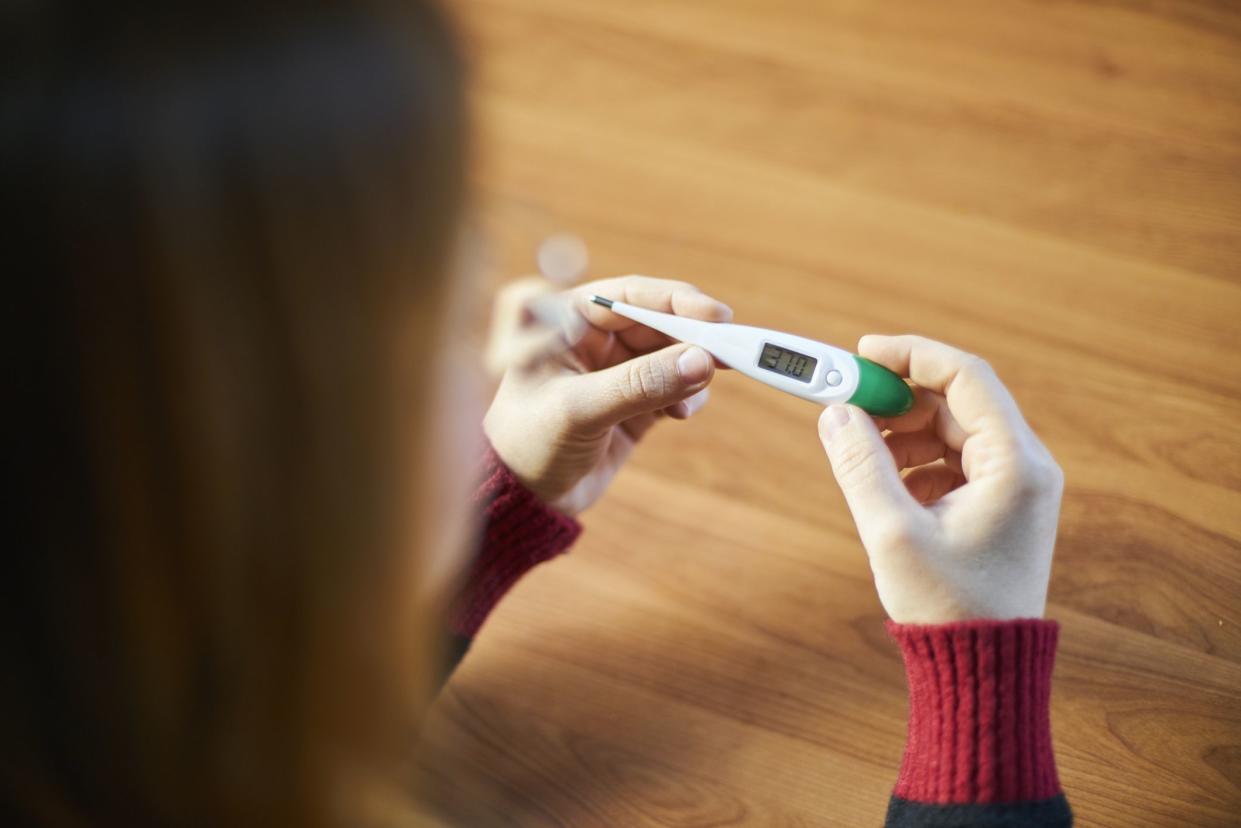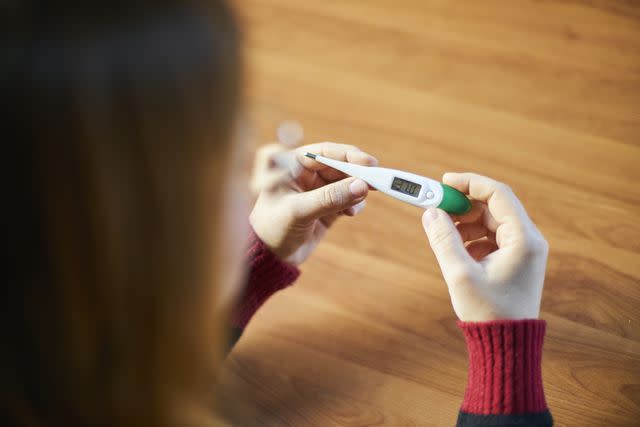All Kinds of Fever Reducers

Nico De Pasquale Photography / Getty Images
Medically reviewed by Kimberly Brown, MD, MPH, FAAEM
A fever reducer is something used to help bring down a fever. This could be a medication such as Advil (ibuprofen) or Tylenol (acetaminophen), or a natural remedy. Fever reducers may differ for children vs. adults.
This article discusses fever-reducing medications and other ways to help bring down a fever.

Nico De Pasquale Photography / Getty Images
Types of Fever Reducers
For most people, a normal body temperature is 98.6 degrees F. If a higher body temperature persists, you may start to look for ways to lower it. A rectal temperature is sometimes taken in children under age 3; a rectal temperature of 100.4 degrees or higher is considered a fever. An oral temperature of 99.5 degrees or higher is considered a fever in children.
In adults, a fever is generally considered to be a temperature over 99 degrees to 99.5 degrees (depending on the time of day, as normal body temperature is lower in the morning and higher in the afternoon).
Over-the-counter (OTC) medications that help to reduce a fever include acetaminophen and nonsteroidal anti-inflammatory drugs (NSAIDs).
Common OTC Fever Reducers
The various names for medicines to reduce a fever can get confusing. Here are common brand names. Some of these are combination medications, so they include fever-reducing medicine along with other medicines:
Acetaminophen brand names: Tylenol, Actamin, Feverall, Panadol, Tempra Quicklets, Dayquil, Nyquil Cold/Flu Relief
Aspirin brand names: Anacin Aspirin Regimen, Bayer, Bufferin, Empirin, Genacote, Miniprin, Uni-Buff, Alka-Seltzer, Anacin Advanced Headache Formula, Excedrin
Ibuprofen brand names: Advil, Midol, Motrin, NeoProfen, Ultrapin, Advil PM
Naproxen brand names: Aleve, Anaprex, Naprosyn, Aleve PM
Acetaminophen can be taken both by adults and children, although the dosage will differ.
Nonsteroidal anti-inflammatory drugs include ibuprofen, naproxen, and aspirin. They lower inflammation and fever in the body. Both acetaminophen and NSAIDs work by stopping the body's production of prostaglandin, a substance that helps control pain and body temperature.
Which drug is right for you will depend on your age, the medical conditions you have, the other medicines you take, and side effects of these drugs.
Some side effects associated with NSAIDs are indigestion, dizziness, drowsiness, and stomach ulcers (from long-term or excessive use). Side effects associated with acetaminophen include an allergic reaction, which also may happen with NSAIDs. Not everyone using these medications will experience side effects.
Are Fever Reducers Always Needed?
Fever reducers aren't always needed if you or someone else you care for has a fever. A fever is the body's way of fighting off illness. A fever can help kill bacteria and viruses. It also can help the body produce white blood cells, which can fight off infection.
However, you should treat a fever if you or a child you're caring for feels uncomfortable or if the fever is higher than 102 degrees.
Fever Reducer Recap: Which Ones Are Kid-Safe?
Kid-safe medicines to reduce fever include acetaminophen and ibuprofen. These can help your child find relief if they have a fever, body aches, or a headache.
It's important to avoid aspirin if your child or teen has a fever. In children, aspirin is associated with side effects such as:
Intestinal bleeding
Reye's syndrome, a serious, often fatal illness affecting the brain and liver
Upset stomach
Chart sources: Aspirin, acetaminophen, ibuprofen
Drug | Age | Dosage | Frequency |
Acetaminophen | 12 weeks or older (or under healthcare provider's direction for under 12 weeks) | By child's weight, check label | Every 4 to 6 hours, no more than 4 doses in 24 hours |
Ibuprofen | 6 months and older | By child's weight, check label | Every 6 to 8 hours |
Do Not Give: Aspirin | Do not give aspirin to any child or teenager | X | X |
Do Not Give: Multi-ingredient products | Do not give multi-ingredient products to a child under 6 years | X | X |
Acetaminophen and ibuprofen can help your child feel better if they have a headache, body aches, or a fever that makes them uncomfortable.
Acetaminophen comes in liquid, pill, and suppository (placed in the rectum) forms. The latter may be useful if your child is throwing up and can't keep down medications taken orally.
Check with a healthcare provider before giving acetaminophen to an infant younger than 3 months, as fever in a baby under 12 weeks should be treated by a healthcare provider.
Ibuprofen is available as a liquid and as chewable tablets. The liquid form has a version for infants and another for toddlers and children through age 11. The infant form is more concentrated. Do not use ibuprofen in babies who are under 6 months old.
Always follow any instructions on labels for dosing. Often, dosing is based on your child's weight. Carefully check the label and use an accurate measuring device for liquid medications (such as a syringe or tool that comes with the medicine rather than a kitchen spoon).
Do not give a multi-ingredient product to a child under age 6. These might combine acetaminophen or ibuprofen with a decongestant or cough suppressant. For example, many such medications are labeled as cold or flu products.
Although some healthcare providers say it's OK to alternate between acetaminophen and ibuprofen, others caution against it as it could lead to more medicine errors and side effects. You may want to discuss this further with a healthcare provider.
It can take 30 to 60 minutes for a fever-reducing medicine to begin to work.
Fever Reducer Recap: What Adults Use
Adults can use acetaminophen, aspirin, ibuprofen, or naproxen to treat a fever. These products come in many formulations, including extended release. Check the label for dosage and frequency. Be sure not to exceed the maximum dosage per day, which may vary by age group.
Safety Varies
Talk to your healthcare provider about which fever reducer is best for you given your age, health conditions, and other medications, supplements, or herbal remedies you take.
If you're pregnant or breastfeeding, it's safe to use acetaminophen for a fever, but talk to a healthcare provider before using it. Low-dose aspirin (81 milligrams) may be used in pregnancy, but talk to a healthcare provider first. Do not take aspirin in the last three months of pregnancy unless directed by a healthcare provider.
You should avoid ibuprofen and naproxen when pregnant unless directed by a healthcare provider. However, it's OK to use ibuprofen or naproxen if you are breastfeeding.
You may want to consider the side effects of these medications when choosing which one to use. Although not everyone will have side effects, it's good to consider them in advance if you are prone to certain side effects or drug reactions.
Some side effects from acetaminophen are:
Anemia (a low number of healthy red blood cells)
Kidney damage
Liver failure
Skin reactions
Do not use acetaminophen for more than 10 days unless directed by a healthcare provider.
Some side effects associated with aspirin are:
Heartburn
Nausea and vomiting
Stomach pain
Some side effects associated with ibuprofen and naproxen include:
Diarrhea or constipation
Dizziness
Drowsiness
Heartburn
More bleeding after an injury
Stomach pain
NSAIDs, including aspirin, ibuprofen, and naproxen, have a risk of severe stomach bleeding. This risk is higher if you are age 60 or older, are taking a blood thinner, have a history of stomach ulcers or bleeding problems, or have three or more alcoholic beverages a day while taking the product.
Except for aspirin, NSAIDs (including ibuprofen and naproxen) increase the risk of heart attack, heart failure, and stroke.
Nondrug Fever Reducers: The Natural Approach
If you don't want to use medications or you want to try some natural fever reducers in addition to medicines, here are a few things that you can do:
Wear light, comfortable clothing.
Stay in a cool room.
Take a lukewarm bath. Don't use water that's too hot or cold, as that could actually raise the body's temperature.
Offer water, diluted juice, or store-purchased electrolyte solutions.
Remove extra blankets.
Drink more fluids to prevent dehydration.
Avoid an ice bath or the use of rubbing alcohol. Although these may cool the skin, they also will cause you to shiver. That then causes the body's core temperature to increase.
When Fever Won't Go Down After a Fever Reducer
If your fever or the fever of someone you care for doesn't go down after using a fever reducer, it may be time to call a healthcare provider. Guidance on when to contact a health care provider varies by age as follows:
For an infant age 3 months or younger: A rectal temperature of 100.4 degrees or more. However, it's always good to check in with a healthcare provider when an infant has a fever.
Age 2 or younger: A fever that lasts more than 24 hours
Over age 2: A fever that lasts more than 72 hours
For any age: A fever that repeatedly goes above 104 degrees
You should also contact a healthcare provider if other symptoms that may need to be treated are present, such as a sore throat, earache, or cough.
Call a healthcare provider right away or go to the emergency room (ER) for a fever accompanied by any of these symptoms:
Breathing trouble
Confusion
Pain when urinating
Seizures
Severe pain
A stiff neck
Swelling
It's also important to get in touch right away with a healthcare provider if you or the person you care for also has a serious chronic condition, such as a heart problem or diabetes.
Summary
Fevers are the body's way of fighting infection. Not all fevers need treatment. Acetaminophen and NSAIDs are two types of medicines to help treat fever. Some medicines, such as aspirin, should not be used to treat fever in children and teens. Always read and follow instructions on how to give medications for fever and at what dosage.
There also are natural ways to reduce fever, such as wearing light clothing and taking a lukewarm bath. In some instances, you should see a healthcare provider for a fever. When in doubt, check in with a healthcare provider for more guidance.

